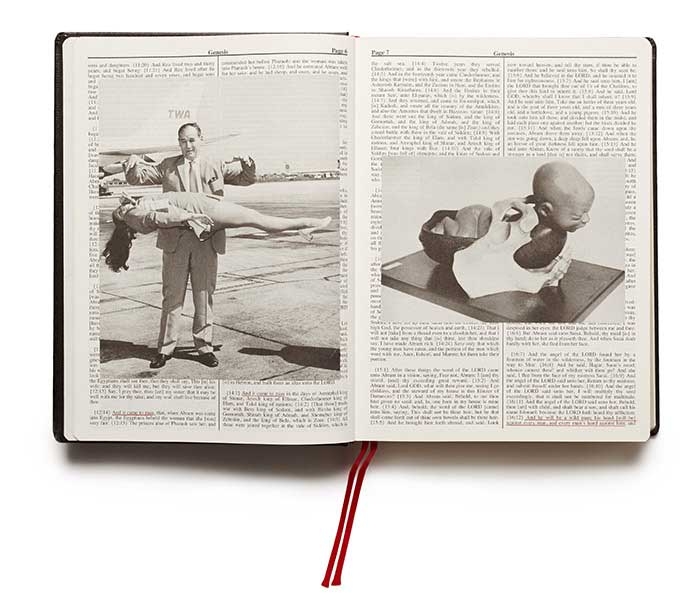Adam Broomberg and Oliver Chanarin’s Holy Bible project is an unhappy one. It is an exact replica of the King James Bible but with at least every other page overlaid with an archive photograph. The image choices are informed by a corresponding line of Scripture, neatly underlined in red to draw the reader’s attention. A photograph of uniform war graves, each desecrated by a daubed swastika, sits near Jeremiah 44:29, ‘And this shall be a sign unto you, saith the Lord’, the words ‘a sign’ highlighted. A police picture of a dead woman, naked and bloodied, possibly sexually assaulted, overlays the last page of Song of Songs. The opening line of the underlined verse 5:2 is heartbreaking, ‘I sleep, but my heart waketh: it is the voice of my beloved that knocketh. Open to me my sister, my love, my dove, my undefiled.’
Not all of Broomberg and Chanarin’s image choices are as depressing – an animal handler, his suit and hairstyle circa 1970s, kisses a tiger (‘Now it came to pass’, Jeremiah 36:16); two young children cuddle a giraffe (‘the beasts of the field and the fowls of the heaven’, Daniel 2:28); a couple dance at their wedding reception (‘we walk in the light’, from the first epistle of John) – but the vast majority of images bear witness to violence, war, poverty and degradation. It is unclear what perspective on religion, and its relationship with the horrors of humanity, Broomberg and Chanarin (winners of this year’s Deutsche Börse Photography Prize) have. An essay by philosopher Adi Ophir foregrounds God’s destructive nature, drawing parallels with modern state-sponsored violence – yet the words of the Bible, their poetry, seem to give comfort to the pictures. If this was intended as a bit of a snarky, Richard Dawkins-esque attack on religion – easily argued given the provocation of covering the ostensible word of God – then I’d question why we look for abstract notions or partial sectors of society on which to blame the violence of the world. Perhaps the fault lies not with God and his believers – but is instead, sadly, tragically, the intrinsic nature of the human animal.
This review originally appeared in the September 2013 issue.
